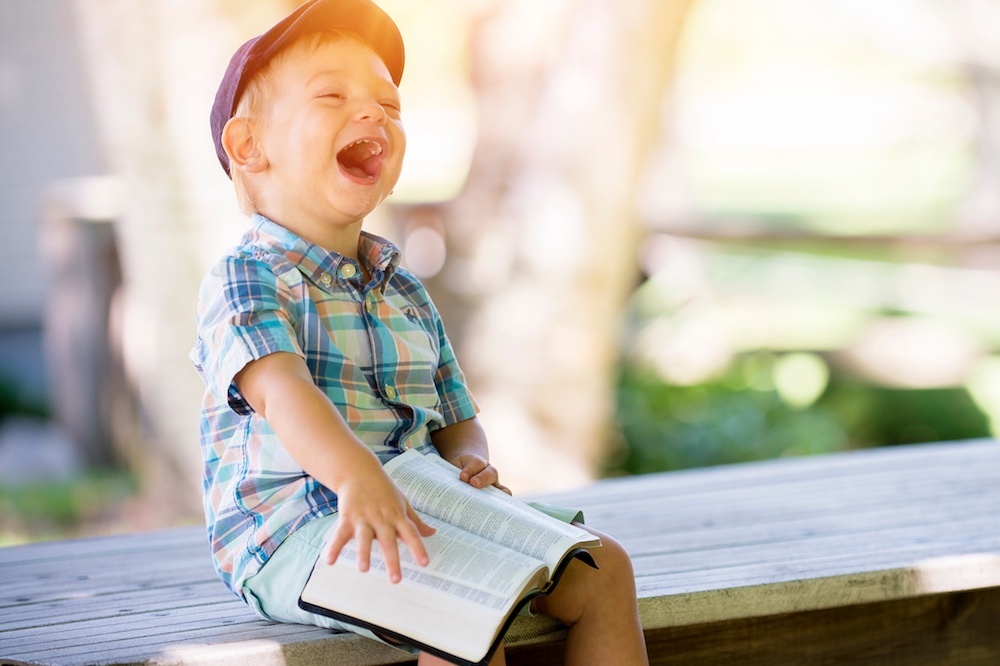
It’s no joke! Laughter is a vital part of a child’s development
Childcare, Early childhood development, Safe pregnancy and birth
For Theirworld's #5for5 campaign, we look at the role of humour - from babies smiling at a very early age to young children using it to form friendships and their identity.
We all like to laugh. It makes us feel good.
Our favourite friends and family are usually the ones we can have a good giggle with. The ones who can see the funny side of most situations.
That’s the same for children. They use humour a lot when it comes to bonding and making friends.
Even babies smile and laugh. It’s one of our first instincts.
Consultant clinical psychologist Dr Rachel Andrew said: “One of the first things that babies do naturally is smile. At first this is not in response to stimulation – but by about eight to 10 weeks old it is.
“Babies laugh spontaneously soon after and from about three months most babies will laugh at their environment. This suggests that humour, smiling and laughing is part of our early natural development.
“For babies and children, it often develops further as part of a social interaction – laughing is a way of engaging others and of connecting via a shared experience.”
But humour and laughter may also have a deeper meaning in terms of survival and defence.
Dr Andrew, of Time Psychology Ltd, is best known in Britain for her appearances as an expert on TV shows and in the media.
She explained: “Smiling could also be linked to evolutionary psychology research – that it is a way of babies engaging others and receiving care in the early days and then used as a social vehicle to develop relationships and form positive bonds.
“Even as children grow, being funny can be a key survival skill and can form part of some children’s identity for life. Humour is also talked about as a defence mechanism.”
As part of Theirworld’s #5for5 campaign, we have been looking at the importance of fun, games and play in early childhood development.
The campaign calls on the international community to invest in quality care for the under-fives – because 90% of brain development happens in those first five years. That care includes play as well as nutrition, health, learning and protection.
World leaders meet in Germany next month at the G20 summit. Theirworld is urging them to support young children by backing a new funding initiative – the International Finance Facility for Education (IFFEd) – that will help to pay for quality pre-primary education programmes.
Laughter can work to bring people together. Legendary funnyman Danny Kaye was the first UNICEF Goodwill Ambassador and travelled the world meeting children and highlighting what was happening in some of the poorest countries in the world.
He said there was no such thing as a language barrier – his language was love and laughter and he engaged with children instinctively.
“Children are the same the world over,” said Danny, who was a Goodwill Ambassador for 33 years until his death in 1987.
“They may have a different culture but an ache or a laugh is universal.”

“If children are healthy and have care and education surely they will be more effective adults, and maybe, just maybe, make the world a better place.”
Consultant clinical psychologist Emma Citron said: “Children find random things funny and enjoy slapstick humour. They can laugh at someone putting a silly hat on their head, so what is funny to a child is often not that funny to an adult.
“Plus adults’ ideas of funny can be far from children’s.
“Adults might think that a clown is funny but we know that many children don’t like clowns at all. Children see funny things in lots of different things – not just what we might think will make them laugh.

“Humour and laughter also defines children’s friendship groups. They will bond with children they can laugh with because they all find the same things funny. There are lots of different people in the word and we all laugh at different things.”
She said parents have an important role to play and that many make the mistake of thinking children are a “different species”.
“Children are people and humour is important to them,” she explained.
“We can tackle difficult subjects with the use of humour. It’s a healthy parenting aid. When things make us laugh, we are less stressed and deal with things in a more positive way.
“Humour allows children to see things from a different perspective and to look at the world in a different way.”
More news

MyBestStart programme gives young girls the education they deserve
